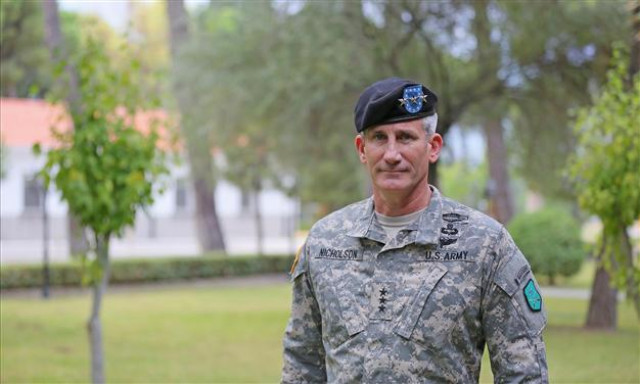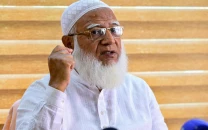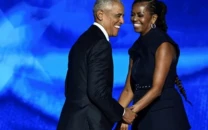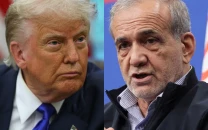Alliance of convenience among terror outfits in Pakistan matter of concern for US: Gen Nicholson
Commander says al Qaeda and Islamic State have transnational ambitions

Lieutenant General John Nicholson. PHOTO: AFP
“Al Qaeda is linked to the Taliban, who are not a designated terrorist organisation but a violent extremist organisation and the Taliban provide a medium for designated terrorist organisations like the Haqqani network, Lashkar-e-Taiba, and AQIS. These five form a loose sort of confederation that complement one another and work together,” General John Nicholson, Commander of US and NATO forces in Afghanistan, told a publication of the Combating Terrorism Centre, an academic institution at the US Military Academy in West Point.
Pakistan plays down US commander’s remarks
The Islamic State, the Islamic Movement of Uzbekistan (IMU) and Tehrik-e-Taliban Pakistan (TTP) have also formed a loose configuration. “So we see these alliances of convenience or where they have complementary goals come together. This is one of our big concerns,” he said. Responding to a question, Nicholson said al Qaeda and the Islamic State have transnational ambitions.
“They have ambitions against the US homeland and the homelands of our allies. So that’s why they’re at the top of the list. The others obviously concern us as well. Many of them have regional ambitions,” he said.
“For example, al Qaeda in the Indian Subcontinent (AQIS) attacks regionally. The Haqqani network goes back and forth. We have the IRGC [Islamic Revolutionary Guard Corps] Quds Forces operating inside Afghanistan, supporting the Taliban. Many of these groups are based in Pakistan, and then some of them fight in Afghanistan. Jaish-e-Mohammed, Lashkar-e-Taiba — we find these operatives showing up in Afghanistan, and so this is the convergence,” Nicholson said.
As a result, the US has developed a regional agenda to combat terrorism, he said.
Trump’s defence aide lauds Pakistan’s resilience in terror fight
A Pentagon-led preliminary plan to defeat the IS has been delivered to the White House and US Defense Secretary Jim (James) Mattis has briefed senior administration officials, a Defense Department spokesperson told reporters, according to Reuters.
Pentagon spokesperson Captain Jeff Davis told reporters that it was the framework for a broader plan and looked at the IS around the world, not just Iraq and Syria.
Davis said the plan would define what defeating the IS meant and was one that would 'rapidly' defeat the militant group.
He added that Mattis would discuss the plan, which is primarily a written one with accompanying graphics, with members of the Cabinet-level Principals Committee.
US-Pakistan relations: some inconvenient truths
The review of US strategy comes at a decisive moment in the US-led coalition effort against the IS in both Iraq and Syria, and could lead to relaxing some of the former President, Barack Obama, administration's policy restrictions, like limits on troop numbers. The Donald Trump administration has said defeating "radical terror groups" is among its top foreign policy goals.
The Baghdad-based US commander on the ground, Army Lieutenant General Stephen Townsend, has said he believed US-backed forces would recapture both of the IS' major strongholds, the cities of Mosul in Iraq and Raqqa in Syria, within the next six months.
Iraqi forces expect a fierce battle against the ISIS to retake Mosul.
In Syria, the US must soon decide whether to arm Syrian Kurdish YPG fighters, despite objections from NATO ally Turkey, which brands the militia group as terrorists.
The US military-led review includes input from Secretary of State Rex Tillerson, as well as from the Treasury Department and the US intelligence community.
Lessons for Pakistan from the US: Democracy only works if you participate
Davis said in addition to diplomacy, the plan would include a military framework that built on capabilities and goals on the battlefield.
Experts have said the Pentagon could request additional forces, beyond the less than 6,000 US troops now deployed to both Iraq and Syria, helping the US military go farther and do more in the fight.
They also said the Pentagon might focus on smaller-scale options like increasing the number of attack helicopters and air strikes as well as bringing in more artillery. The military may also seek more authority to make battlefield decisions.
With additional input from Reuters.



















COMMENTS
Comments are moderated and generally will be posted if they are on-topic and not abusive.
For more information, please see our Comments FAQ